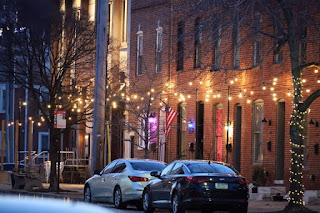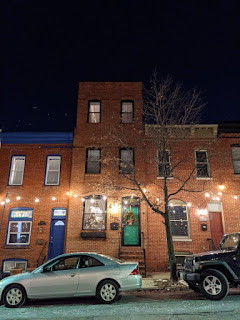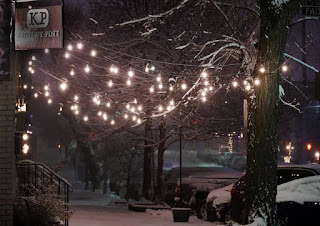Q&A: Everything You Need To Know About Getting Neighborhood Lights
How much will the lights cost?
A good estimate for parts plus labor is $100 to $125 per house. The more houses that sign up, the cheaper it is per house.
Startup costs include materials and labor.
The LED bulbs are replaceable, around $1 per bulb on Amazon, and have a rate lifespan of 15,000 hours.
The actual lights are UV rated and thick gauge cable, so they don't break down for many years even in the elements. As long as someone has a 6-12-foot ladder, you can easily replace the bulbs as needed.
Each house has one hook installed in the mortar joint about 13.5 feet up, just below the second floor windows.
A cable is run down the street parallel to the houses. The lights bounce back and forth from the cable to the hooks on the houses in a zigzag pattern down the street.Generally, one house powers the lights for the block using an exterior outlet (on front of house, rooftop deck, or side of house.)
The lights are LED and very efficient.
A 96-foot section of the lights only pulls the equivalent power of one 60 watt incandescent bulb. And 96 foot generally covers three to four houses.
Every block is different. Some blocks have plenty of trees, light posts and street signs to tie into, some have none. But they can add poles to tie into, if needed.
What kind of bulbs are used?The bulbs are plastic and shatterproof with dual filament 1.8W LED. A 96-foot section of LED lights, pulls 54 watts of current and will generally cover three to four homes.
Why LED plug-in Café Lights v. Solar?
We use LED plug-in Cafe lights over solar because they are brighter. The plug-in lights are also chainable, while the solar lights are isolated systems and rely on sunlight.
Who pays the monthly electric bill?
Typically a single house powers the lights for the block. On some longer blocks, you can split to between two homes. It costs an addition $4-5 a month on your BGE bill. Every block comes up with a way to handle paying the electricity and splitting the cost between neighbors.





Comments
Post a Comment